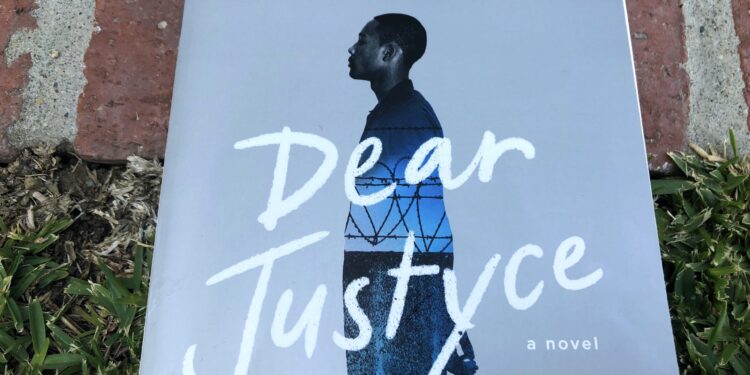Table of Contents
ToggleIntroduction
Dear Justyce Summary And Themes By Nic Stone Dear Justyce is a powerful and emotionally charged young adult novel written by Nic Stone. It is a companion novel to Stone’s debut, Dear Martin, and continues to explore the deep societal issues of race, systemic injustice, and the struggles faced by young Black men in America. In Dear Justyce, Stone brings readers back into the world of Justyce McAllister, the protagonist of Dear Martin, but this time from the perspective of Quan Banks, a character first introduced in the previous book. Through Quan’s voice, Dear Justyce delves into the realities of being caught in the school-to-prison pipeline, the complexities of friendship, and the search for identity in a world that often categorizes young Black men based on stereotypes.
The novel deals with themes of racism, injustice, and social systems that disproportionately impact African Americans, particularly the challenges faced by Black youth. In Dear Justyce, Quan’s journey toward understanding himself and confronting the harsh realities of his environment is both heartbreaking and enlightening. Stone’s writing continues to be a call for empathy and change in how society views and treats young Black individuals.
In this novel, readers are invited to witness the internal battle of a young man who is torn between the pull of his surroundings, the weight of his past mistakes, and his desire for a better future. Through Quan’s story, Dear Justyce presents a raw and unflinching look at how the criminal justice system, societal expectations, and personal choices intersect in the life of a young Black man trying to navigate a world stacked against him.
Summary of Dear Justyce by Nic Stone
The story of Dear Justyce unfolds through the letters written by Quan Banks, a young man who is currently in juvenile detention after being arrested for his involvement in a shooting. Quan’s narrative is framed by a series of letters he writes to Justyce McAllister, the protagonist of Dear Martin. Quan feels a deep connection to Justyce because, like him, Justyce was a young Black man who found himself at odds with the world around him. The letters are a way for Quan to express his feelings, seek advice, and grapple with the confusion and anger that come with growing up in a system that seems to offer him no chances.
Read More
Quan’s Backstory
Quan’s life has been shaped by the struggles of growing up in poverty and dealing with the overwhelming racial discrimination in his community. Raised in the projects, Quan was exposed to violence and crime from a young age. His mother’s absence left a void that his grandmother, Big Mama, tried to fill. Though Big Mama did her best to raise him, Quan found himself drawn to the streets, where he befriended Garrett, a boy who would eventually lead him down a dangerous path.
From the beginning, Quan’s life seems set on a tragic trajectory. He was a kid with dreams of something better, but his choices were limited by the environment around him. Despite his good intentions, he fell into the wrong crowd, influenced by the promises of respect and belonging that came with joining a gang. This decision set the stage for his eventual involvement in the shooting that led to his arrest.
Quan’s relationship with his father, Moses, is another key aspect of his story. Moses is a man who is often absent from Quan’s life, but when Quan gets into trouble, he begins to realize just how important it is to have a father figure, even one who is imperfect. Moses’ own struggles with the law and his attempts to make sense of his son’s decisions add complexity to their relationship, as Quan seeks guidance but also resents his father’s failures.

The Incident
The inciting incident in Dear Justyce occurs when Quan is involved in a shooting. During a confrontation that escalates into violence, Quan makes a fateful choice, and the consequences are far-reaching. Although he didn’t pull the trigger, Quan is implicated in the crime, and he ends up arrested and sent to juvenile detention. His time in the system is filled with moments of self-doubt, anger, and confusion, as he tries to come to terms with how his life spiraled out of control. It’s in these moments that Quan begins writing to Justyce, reaching out for a lifeline as he questions whether he’s doomed by his past decisions or if there’s still a chance for him to change.
As Quan’s letters unfold, he reveals the complexities of his emotions: his frustration with the justice system, his confusion over his own identity, and his desire for something better but not knowing how to get there. Quan is haunted by the idea that society has already made up its mind about him. He worries that he is a “bad kid” and that his mistakes have sealed his fate, even though he is still so young.
Justyce and Quan’s Relationship
Although Justyce McAllister and Quan Banks come from different backgrounds, their experiences of racial discrimination and societal injustice bind them together. Justyce, who is more academically inclined and has found some success despite his struggles, serves as a kind of role model to Quan. Quan is drawn to Justyce’s intellect and his ability to speak out against the injustices he faces. Through their letters, Quan begins to understand the complexities of Justyce’s life, but also sees how similar their struggles are. Both are Black young men in a world that is quick to judge them, and both are trying to figure out their place in a society that often devalues them.
Justyce’s responses to Quan are both compassionate and challenging. He provides encouragement but also points out the harsh realities of Quan’s choices and actions. Justyce’s words push Quan to reflect more deeply on his decisions, the people around him, and what he wants for his future. Through their exchange, the novel explores the power of mentorship and counsel, as Justyce becomes a source of guidance and hope for Quan.
Themes of Systemic Racism and Justice
At the heart of Dear Justyce is a deep exploration of systemic racism and the criminal justice system. Stone highlights the ways in which Black youth, especially young men like Quan, are often trapped in a cycle of poverty, violence, and criminality due to the systemic barriers placed before them. The novel paints a picture of a world where law enforcement and the justice system are often unforgiving, particularly toward those from marginalized communities.
Quan’s life trajectory is a stark representation of how the system works against young Black people, pushing them toward incarceration rather than rehabilitation. His letters reveal the frustration and sense of hopelessness that often accompany these experiences. In contrast, Justyce’s experiences show a different side of the justice system — one that is more nuanced, where intellectual success and social mobility are possible, but only when one is given the opportunity to overcome the obstacles set before them.
Quan’s Growth and Redemption
As the story progresses, Quan begins to confront the reality of his own actions. He realizes that his decisions have consequences, but he also starts to question the system that pushed him into those decisions in the first place. He starts to think more critically about the choices he has made, his involvement with the gang, and what his future could look like if he were given a chance. Through his letters to Justyce, he begins to see that redemption is possible but it will take hard work and a willingness to confront his own flaws and the world around him.
In the end, Quan’s journey is one of self-realization and hope. While the novel does not shy away from the harsh realities that many young Black men face, it also offers a message of empowerment — that change is possible, even in the face of overwhelming odds. Through his correspondence with Justyce, Quan begins to forge a path toward healing and understanding, though the road ahead is still long and uncertain.
Themes and Analysis of Dear Justyce by Nic Stone
1. The Cycle of Injustice
Dear Justyce powerfully examines the school-to-prison pipeline, showing how young Black men like Quan are often pushed toward criminality due to societal circumstances beyond their control. This theme highlights the limited options available to people like Quan, who, without positive intervention, often find themselves caught in a system that penalizes them for surviving difficult circumstances.
2. The Impact of Mentorship
The relationship between Justyce and Quan demonstrates the profound impact mentorship can have on a young person’s life. Justyce’s letters are not only a source of solace for Quan but also serve as a guiding force that challenges him to reflect on his actions and strive for something better. This theme speaks to the importance of role models, supportive relationships, and community in helping marginalized individuals make better choices.
3. Identity and Self-Discovery
Quan’s journey is also one of self-discovery. As he reflects on his past mistakes and begins to grapple with his identity, he learns to separate who he is from the mistakes he’s made. The novel explores how young people can learn to redefine themselves and create new futures for themselves, even when the world around them insists they are products of their environment.
Read More
4. Redemption and Forgiveness
Another key theme in Dear Justyce is redemption. Quan’s desire to turn his life around and seek a better future is rooted in his understanding that while mistakes have been made, it is never too late to seek forgiveness and growth. His journey towards redemption is both heartbreaking and inspiring, illustrating that change is difficult, but not impossible.

Conclusion
Nic Stone’s Dear Justyce is a compelling exploration of race, justice, and identity in contemporary America. Through Quan Banks’ journey, the novel shines a light on the often-forgotten experiences of young Black men navigating a world full of systemic obstacles. With its poignant message of hope, self-discovery, and redemption, Dear Justyce is both a heart-wrenching and empowering story, urging readers to consider the complexities of injustice and the transformative power of mentorship and honesty.
Read More
FAQ
Q: How is Dear Justyce connected to Dear Martin?
A: Dear Justyce is a companion novel to Dear Martin, which follows the story of Justyce McAllister, a young Black student trying to navigate racial injustice in America. Dear Justyce shifts the focus to Quan Banks, a character who was introduced in the first book, and tells his story of being caught in the criminal justice system.
Q: What are the main themes of Dear Justyce?
A: The main themes of Dear Justyce include systemic racism, the school-to-prison pipeline, identity, mentorship, and redemption. The novel explores the impact of societal structures on young Black men and the complexities of personal growth and self-discovery.
Q: Does Dear Justyce offer a hopeful message?
A: Yes, while the novel addresses the harsh realities of racial injustice and mental struggles, it ultimately conveys a message of hope and redemption. Quan’s journey demonstrates that while the road to change can be difficult, it is not impossible, and personal transformation is achievable.
Q: How does Dear Justyce explore the criminal justice system?
A: Dear Justyce delves into how the criminal justice system disproportionately affects Black youth, particularly through the character of Quan Banks, who finds himself caught up in the system. The novel critiques how society labels and punishes young Black men, often without offering opportunities for rehabilitation or second chances.
Q: Is Dear Justyce a standalone novel or part of a series?
A: While Dear Justyce is a companion novel to Dear Martin, it can be read as a standalone book. However, readers may benefit from reading Dear Martin first to understand the context of Justyce McAllister’s story and his relationship with Quan Banks.
Read More
















